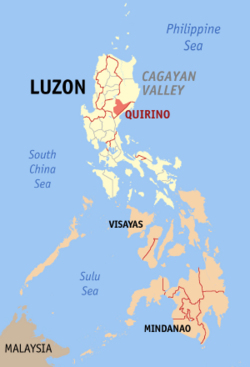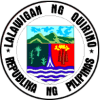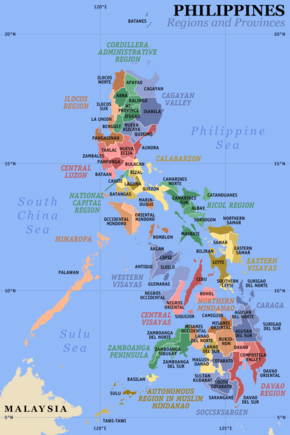Quirino
| Quirino | |||
|---|---|---|---|
| — Province — | |||
|
|||
 |
|||
| Coordinates: | |||
| Country | |||
| Region | Cagayan Valley (Region II) | ||
| Founded | June 18, 1966 | ||
| Capital | Cabarroguis | ||
| Government | |||
| - Governor | Junie E. Cua (Lakas-Kampi-CMD) | ||
| Area | |||
| - Total | 3,486.2 km2 (1,346 sq mi) | ||
| Area rank | 40th out of 80 | ||
| Population (2007) | |||
| - Total | 163,610 | ||
| - Rank | 72nd out of 80 | ||
| - Density | 46.9/km2 (121.6/sq mi) | ||
| - Density rank | 78th out of 80 | ||
| Divisions | |||
| - Independent cities | 0 | ||
| - Component cities | 0 | ||
| - Municipalities | 6 | ||
| - Barangays | 132 | ||
| - Districts | Lone district of Quirino | ||
| Time zone | PHT (UTC+8) | ||
| ZIP Code | |||
| Spoken languages | Ilokano, Tagalog | ||
Quirino is a province of the Philippines located in the Cagayan Valley region in Luzon. Its capital is Cabarroguis and was named after Elpidio Quirino, the sixth President of the Philippines. The province borders Aurora to the southeast, Nueva Vizcaya to the west, and Isabela to the north. Quirino used to be part of the province of Nueva Vizcaya, until it was separated in 1966.
Contents |
Demographics
The population of the province as of the year 2000 census of population was 148,575, with a density of roughly 49 persons per square kilometer of land. The major language is Ilocano, which is widely spoken in the lowlands by 71.46 percent of the total populace. Ifugao is predominant in the uplands. Other languages are Bungkalot, Pangasinense, and Kankanai.
Economy
Agriculture is the main industry in Cagayan Valley, together with rice and corn as major crops. These supply the demand of neighboring provinces and the metropolis. Banana as well as banana chips are major products sold in Metro Manila and Pampanga. Small scale industries like furniture making, basketry, rattan craft, and dried flower production are prevalent.
Geography
Political
Quirino is subdivided into 6 municipalities.
- Aglipay
- Cabarroguis
- Diffun
- Maddela
- Nagtipunan
- Saguday
Physical
The Sierra Padre mountain range provides a natural barrier on the eastern and southern border of the province and the Mamparang Range on the western part. The province is generally mountainous, with about 80 percent of the total land area covered by mountains and highlands.
The province has a mean annual temperature of 33.6 degree Celsius. Warmest month is May and the least dry months are March to August while the rest of the year is neither too dry nor too wet. Rainy days occur from September to November.
History
Long before its formal creation as an independent province, Quirino was the forest region of the province of Nueva Vizcaya, inhabited by tribal groups known as the Negritos. They roamed the hinterlands and built their huts at the heart of the jungle.
Quirino lies in the southeastern portion of Cagayan Valley. It is situated within the upper portion of the Cagayan River basin and bounded by Isabela on the north, Aurora on the east and southeast, and Nueva Vizcaya on the west and southwest.
The Ilocano dialect is used widely in the lowlands of the province’s various municipalities while Ifugao is predominant in the uplands.
Quirino province acquired its juridical personality as a result of the division of the provinces of Nueva Vizcaya and Isabela on June 18, 1966 under RA 4734. Quirino, named after the late president Elpidio Quirino, was created as a sub-province of Nueva Vizcaya in 1966. It became a full province in 1971.
On June 21, 1969, RA 5554 was enacted, amending RA 4734 and creating the municipality of Cabarroguis, now the capital town of Quirino, which was taken from portions of Diffun, Saguday, and Aglipay.
RA 6394 was passed on September 10, 1971 further amending RA 5554 and separating the sub-province of Quirino from its mother province, Nueva Vizcaya, constituting it into a regular province. Hon. Leonardo B. Perez authored RA 6394.
The province of Quirino was formally established on February 10, 1972 upon the assumption to office of the first elected provincial and municipal officials headed by Dionisio A. Sarandi as Provincial Governor.
On February 25, 1983, Batas Pambansa Blg. 345 was enacted, creating within Quirino the municipality of Nagtipunan, a division of the municipality of Maddela.
External links
- Official Website of the Provincial Government of Quirino
- WOW Philippines - Quirino
- / Quirino Province Forum - An Online Community for the real Quirinians
|
|||||


